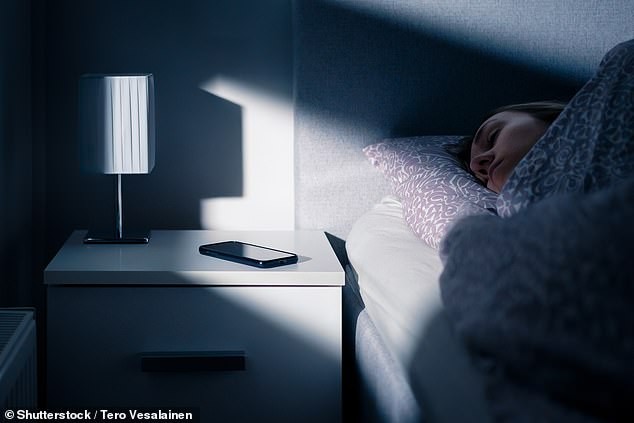Five Things Your Brain Never Shows in a Dream and Why Your Phone Is One of Them
Dreams carry us on wild journeys, from flying through the sky to turning up to an exam without your trousers. But no matter how vivid our dreams, some details simply vanish when we sleep. Despite the average Briton spending more than three hours a day on their phones, people simply never dream about their devices. In fact, scientists say there are five things that you will never see in a dream. Besides smartphones, dream researchers say that our sleeping minds either can't or won't recreate common details of the waking world. That means words, numbers, smells and tastes, and even our own reflections, almost never show up in dreams. Dr Kelly Bulkeley, dream researcher and director of the Sleep and Dream Database, told Daily Mail: 'In dreaming, our minds operate in a more fluid, emotional and associative manner. The flip side is that we tend to have less capacity in dreaming for the short–term focus and concentration required for reading, counting, and operating a computer.' Although we spend three hours a day on our phones, scientists say that they are one of the five things that never appear in our dreams.

In This Article:
Phones in Dreams Rare Visitors
It is well established that the content of our dreams tends to reflect the details of our waking lives. Yet despite how long we tend to spend using phones and other electronic devices, studies show that they almost never appear in dreams. Analysis of 16,000 reported dreams shows that phones only appear in about 3.55 percent of women's dreams and 2.69 percent of men's dreams. This is tiny compared to other pieces of tech, such as cars, which appear in about nine percent of dreams – especially considering how often we use phones. According to scientists, this is because phones don't fit in with the function that dreams have evolved to play. The 'threat simulation hypothesis' suggests that dreams are an evolved defence mechanism that helps us process dangers we might face in the real world. Dr Deirdre Barrett, a psychologist from Harvard University and author of The Committee of Sleep, told Daily Mail: 'Content that is relevant only to modern–day life tends to be underrepresented in dreams.' Researchers suggest that dreams evolved as a defence mechanism to prepare us to face threats. This is why we dream of running away from threats and falling more than our smartphones. 'Content that would have been of the most relevance to humans over 95 percent of their evolution when they were living a tribal life on the savannas is over–represented in modern humans' dreams.' Humans tend to dream far more of storms, running from wild animals, and snakes because these were things that evolution has hardwired us to pay attention to for survival. Mobile phones, on the other hand, don't play a role in our dreams because they've only been with us for a tiny fraction of our evolutionary history.

Written Text in Dreams: The Texts That Never Sit Still
One of the strangest features of dreams is that people generally report that it is almost impossible to read written text. When written documents do appear in dreams, people often report that the text is reduced to nonsense or abstract symbols. Even though some people remember being able to understand what this text said, cases of reading actual text in dreams are extremely rare. Scientists believe this is connected to the underlying physiological processes that accompany dreaming. Very few people are able to read text in dreams. When written words do appear in dreams, they either appear as nonsense symbols or change in front of our eyes. Dr Barrett says: 'Brain areas that have anything to do with language, even generally, are less active during rapid eye movement (REM) sleep, the stage in which most dreams occur, and ones associated specifically with text and reading are even less active.' This means that our brains don't process the fine details of written text, leading to the distorted symbols or shifting pages of text that dreamers sometimes see. Interestingly, some writers, especially poets, sometimes report being able to read small amounts of text in dreams. Researchers think this may be because the parts of their brains that deal with language are more active even in sleep.

Numbers in Dreams: The Instability of Details
If you've ever dreamt about having a delicious meal, think carefully about what you really experienced. One study found that just one percent of men and slightly over one percent of women reported an 'olfactory' experience in their dreams. You might have dreamed about seeing the food on the table or watching others eat, but you almost certainly didn't dream about what it tasted like. Just like the written word, numbers like mathematical equations or the digits on a clock rarely appear in dreams. When they do, dreamers often report that they are distorted, illegible, or shift and change when they look away. Scientists have found that the areas of the brain associated with language (red and blue) are less active while we dream, which might explain why we cannot dream about written words. According to dream experts, this is actually a necessary consequence of the way dreams are structured. Dr Benjamin Baird, a cognitive neuroscientist from the University of Texas, told Daily Mail: 'A useful way to think about it is that waking perception is stabilised by continuous, detailed bottom–up input from the external world. In dreams, by contrast, the brain generates the scene largely from the top down with little or no external input. So fine–grained details, like written text, numbers, or device interfaces, tend to be unstable or morph when you look back.' It's not necessarily that our dreams can't contain numbers, but rather that our dreams lack the stability that's needed to show numbers coherently.

Smell and Taste in Dreams: Senses Left Behind
If you've ever dreamt about having a delicious meal, think carefully about what you really experienced. One study found that just one percent of men and slightly over one percent of women reported an 'olfactory' experience in their dreams. Some researchers have suggested this might be because the brain circuits that control smell evolved in our very distant past. That could mean smell information doesn't overlap with signals from vision and auditory networks and gets included in dreams less often. However, it could also be the fact that most people simply don't pay attention to smells and tastes the way we do with sight and sound. Dr Bulkeley says: 'We have sensations of smell and taste every day, yet almost never dream about them. Why? In this line of reasoning, because they don't usually have much to add to the dramatic unconscious stories we tell ourselves when we sleep.'

Mirrors in Dreams: Distorted Reflections
Although people can look in a mirror while dreaming, they will almost never see an accurate image themselves. Your reflection may be distorted, injured, the wrong age, or you may even see an entirely different person. It's a popular misconception, but it isn't actually true that you can't look in a mirror in your dreams. However, the science of seeing your reflection in dreams is actually even stranger. When people do see themselves in mirrors, they almost never see their reflection as it really would be in waking life. Instead, Dr Barrett explains, most people see themselves as bizarrely distorted or disfigured. They might see themselves at any age, with some plausible injury, or with a completely fantastic transformation. Dr Barrett adds: 'They can see a completely other person in the mirror. They may be shocked at this; in other cases, not even questioning it.' Scientists aren't quite sure why this is the case, but it may be connected to the lack of stability inherent in dreams. Just like we cannot dream up the words on a page without any input from the real world, rendering all the features of our own face might be too complicated for our dreaming brains to handle. Though these interpretations might give you an idea of what's behind your nightmares, the meaning of dreams will vary according to your own personal associations and experiences. Here, Sarah Bick, a clinical and cognitive hypnotherapist working with the subconscious mind at Inna Therapies, details how to interpret your own unique dreams, bad or good.


